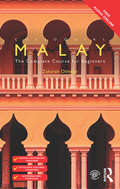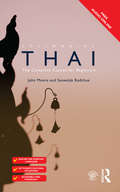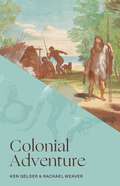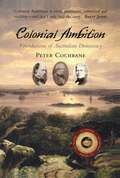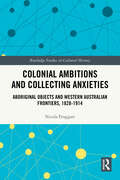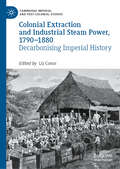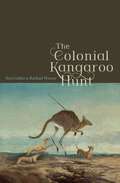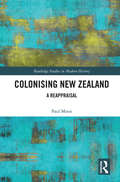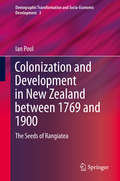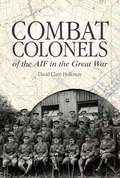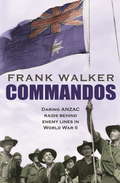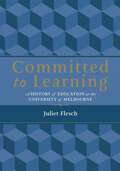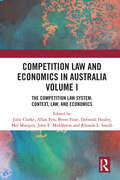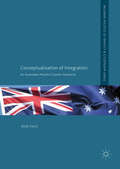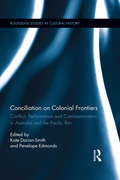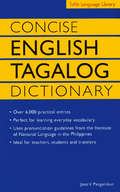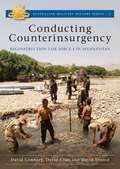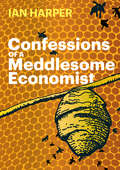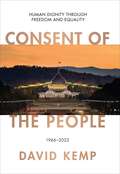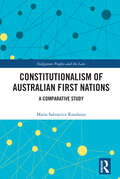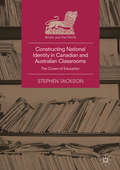- Table View
- List View
Colloquial Malay: The Complete Course for Beginners (Colloquial Ser.)
by Zaharah OthmanColloquial Malay: The Complete Course for Beginners has been carefully developed by an experienced teacher to provide a step-by-step course to Malay as it is written and spoken today. Combining a clear, practical and accessible style with a methodical and thorough treatment of the language, it equips learners with the essential skills needed to communicate confidently and effectively in Malay in a broad range of situations. No prior knowledge of the language is required. Colloquial Malay is exceptional; each unit presents a wealth of grammatical points that are reinforced with a wide range of exercises for regular practice. Key features include: A clear, user-friendly format designed to help learners progressively build up their speaking, listening, reading and writing skills Jargon-free, succinct and clearly structured explanations of grammar An extensive range of focused and dynamic supportive exercises Realistic and entertaining dialogues covering a broad variety of narrative situations Helpful cultural points explaining the customs and features of life in Malay-speaking countries. An overview of the sounds of Malay. Balanced, comprehensive and rewarding, Colloquial Malay is an indispensable resource both for independent learners and students taking courses in Malay. Audio material to accompany the course is available to download free in MP3 format from www.routledge.com/cw/colloquials. Recorded by native speakers, the audio material features the dialogues and texts from the book and will help develop your listening and pronunciation skills.
Colloquial Thai: The Complete Course For Beginners (Colloquial Ser.)
by John Moore Saowalak RodchueColloquial Thai: The Complete Course for Beginners has been carefully developed by an experienced teacher to provide a step-by-step course to Thai as it is written and spoken today. Combining a clear, practical and accessible style with a methodical and thorough treatment of the language, it equips learners with the essential skills needed to communicate confidently and effectively in Thai in a broad range of situations. No prior knowledge of the language is required. Colloquial Thai is exceptional; each unit presents a wealth of grammatical points that are reinforced with a wide range of exercises for regular practice. A full answer key, a grammar summary, bilingual glossaries and English translations of dialogues can be found at the back as well as useful vocabulary lists throughout. Key features include: A clear, user-friendly format designed to help learners progressively build up their speaking, listening, reading and writing skills Jargon-free, succinct and clearly structured explanations of grammar An extensive range of focused and dynamic supportive exercises Realistic and entertaining dialogues covering a broad variety of narrative situations Helpful cultural points explaining the customs and features of life in Thailand. An overview of the sounds of Thai Balanced, comprehensive and rewarding, Colloquial Thai is an indispensable resource both for independent learners and students taking courses in Thai. Audio material to accompany the course is available to download free in MP3 format from www.routledge.com/cw/colloquials. Recorded by native speakers, the audio material features the dialogues and texts from the book and will help develop your listening and pronunciation skills.
Colonial Adventure
by Ken Gelder Rachael WeaverAdventure was one of the grand narratives of colonisation, which saw European powers sending agents off to new and distant worlds. Their journeys didn't always follow a straight line. Some were shipwrecked, lost or marooned; adventure turned into misadventure. Others left the colony as soon as they arrived. Convicts fled to Timor, China, and South America, while bushrangers roamed the country, antagonising colonial authorities. But when adventurers directly served the interests of colonisation, they could be violent, ruthless, and brutally racist, rapaciously seeking profit and property. Many adventurers went wherever ambition took them, killing and dispossessing Aboriginal people and claiming ownership of their lands. By examining colonial adventure narratives in all their rawness and complexity, this book asks us to reflect on the continuing legacies of colonisation in Australia today.
Colonial Ambition: Foundations of Australian Democracy
by Peter CochraneColonial Ambition tells the story of the politicians and would-be politicians of Sydney, who were driven by a determination to lift themselves and their new colony to a higher level. They wanted parliamentary liberty, though they were sharply divided over the form it might take and these divisions, centred in Sydney, were unremitting. Peter Cochrane tells of the fight for responsible government and democracy through a memorable cast of characters: W.C. Wentworth, Sir George Gipps, Robert Lowe, Lord Howick (Earl Grey), Henry Parkes, Charles Cowper, Lord John Russell and more, all of whom speak for themselves, in the robust language of the day. Written with great brio and verve, Peter Cochrane has brought to life the various players in a way that is very rare in the writing of Australian history. Colonial Ambition is testament that Australia does have a rich and exciting political history.
Colonial Ambitions and Collecting Anxieties: Aboriginal Objects and Western Australian Frontiers, 1828–1914 (Routledge Studies in Cultural History)
by Nicola FroggattEuropean portrayals of Aboriginal people and their objects have long had political implications. This book explores ‘ethnographic’ objects from Western Australia now in British and Irish museums, and is the first full scholarly treatment of their part in fashioning colonial relationships and identities over the nineteenth and early twentieth centuries. It scrutinises a body of material that once sparked extensive scholarly and popular interest, but has since been largely overlooked in scholarship into the relationship between collecting and empire.This book assesses how non-Aboriginal collectors understood Aboriginal objects, and what this reveals about colonial relationships, anxieties and ambitions. Considering objects now spread across the British Isles, it examines intersecting impulses that informed collecting: notions of the ‘frontier’, the navigation of one’s experiences across sites of empire, and the Eurocentric narrative of Aboriginal ‘extinction’, to show how colonial ideology intersected with personal experience. It scrutinises collectors’ own accounts as well as the voices of other individuals involved in collecting episodes, showing how ideas about indigenous peoples were being developed and contested.Colonial Ambitions and Collecting Anxieties is particularly aimed at scholars of material culture, histories of collecting and empire, cultural heritage workers and other readers interested in museums, colonialism and Australian history.
Colonial Extraction and Industrial Steam Power, 1790–1880: Decarbonising Imperial History (Cambridge Imperial and Post-Colonial Studies)
by Liz ConorThis book untangles the connections between British industrialization and colonial expansion in the late-eighteenth and nineteenth centuries. The addition of fossil fuels to the energy mix in this period drove overwhelming social and economic change in Britain, the north-east United States, and Europe, but it also had important and uneven consequences within a range of Euro-American colonies. Opening a new field of inquiry into fossil fuel-powered technologies and their critical role in colonial expansion, this book demonstrates how carbon- based economies dramatically accelerated the annexing of foreign lands and the extraction of their resources. Yet, while the use of coal on a commercial scale from the late 1700s powered an explosion of growth in manufacturing between 1760 and 1840 and these years coincided with the incursion and violence on colonial frontiers, the peripheries tended to rely on wood where they could. This intensification of animal and timber power complicated the nationalist narratives of coal-fired industrialization and economic development. A history of the meanings and ideas around carbon, fossil fuels, and their bearing within colonial expansion is increasingly relevant as rapid changes to climate bring into focus the legacy of carbonization in dispossession, sustainability, environmental, labor, and atmospheric relational histories.
Colonial Kangaroo Hunt
by Ken Gelder Rachael WeaverFrom the arrival of Captain James Cook in 1770 to classic children's tale Dot and the Kangaroo, Ken Gelder and Rachael Weaver examine hunting narratives in novels, visual art and memoirs to discover how the kangaroo became a favourite quarry, a relished food source, an object of scientific fascination, and a source of violent conflict between settlers and Aboriginal people. The kangaroo hunt worked as a rite of passage and an expression of settler domination over native species and land. But it also enabled settlers to begin to comprehend the complexity of bush ecology, raising early concerns about species extinction and the need for conservation and the preservation of habitat.
Colonising New Zealand: A Reappraisal (Routledge Studies in Modern History)
by Paul MoonColonising New Zealand offers a radically new vision of the basis and process of Britain’s colonisation of New Zealand. It commences by confronting the problems arising from subjective and ever-evolving moral judgements about colonisation and examines the possibility of understanding colonisation beyond the confines of any preoccupations with moral perspectives. It then investigates the motives behind Britain’s imperial expansion, both in a global context and specifically in relation to New Zealand. The nature and reasons for this expansion are deciphered using the model of an organic imperial ecosystem, which involves examining the first cause of all colonisation and which provides a means of understanding why the disparate parts of the colonial system functioned in the ways that they did. Britain’s imperial system did not bring itself into being, and so the notion of the Empire having emerged from a supra-system is assessed, which in turn leads to an exploration of the idea of equilibrium-achievement as the Prime Mover behind all colonisation—something that is borne out in New Zealand’s experience from the late eighteenth century. This work changes profoundly the way New Zealand’s colonisation is interpreted, and provides a framework for reassessing all forms of imperialism.
Colonization and Development in New Zealand between 1769 and 1900: The Seeds of Rangiatea (Demographic Transformation and Socio-Economic Development #3)
by Ian PoolThis book details the interactions between the Seeds of Rangiatea, New Zealand's Maori people of Polynesian origin, and Europe from 1769 to 1900. It provides a case-study of the way Imperial era contact and colonization negatively affected naturally evolving demographic/epidemiologic transitions and imposed economic conditions that thwarted development by precursor peoples, wherever European expansion occurred. In doing so, it questions the applicability of conventional models for analyses of colonial histories of population/health and of development. The book focuses on, and synthesizes, the most critical parts of the story, the health and population trends, and the economic and social development of Maori. It adopts demographic methodologies, most typically used in developing countries, which allow the mapping of broad changes in Maori society, particularly their survival as a people. The book raises general theoretical questions about how populations react to the introduction of diseases to which they have no natural immunity. Another more general theoretical issue is what happens when one society's development processes are superseded by those of some more powerful force, whether an imperial power or a modern-day agency, which has ingrained ideas about objectives and strategies for development. Finally, it explores how health and development interact. The Maori experience of contact and colonization, lasting from 1769 to circa 1900, narrated here, is an all too familiar story for many other territories and populations, Natives and former colonists. This book provides a case-study with wider ramifications for theory in colonial history, development studies, demography, anthropology and other fields.
Combat Colonels: of the AIF in the Great War
by David Clare HollowayCombat Colonels seeks to address the regrettable gap in Australia's documented history of its combat colonels. Its purpose is to name all the Commanding Officers who led units into actions in the Great War and to describe their lives before and, for those who survived, after the war. From these pages emerge the men who shaped Australia's battlefield history - both the professional soldiers and the former teachers, accountants, salesmen, clerks, farmers and others from a broad range of occupations whose leadership on and off the battlefield proved so crucial. These are men Australia cannot afford to forget.
Commandos: Heroic and Deadly ANZAC Raids in World War II
by Frank WalkerAmazing revelations and extraordinary exploits of Australia's elite secret warriors.There was something unique about Australians and New Zealanders in war that prompted World War II Allied commanders to turn to ANZAC soldiers, sailors and airmen to carry out the most dangerous and virtually impossible missions behind enemy lines.Paddling canoes 4,000 kilometres to attack enemy ships in Singapore; lightning raids on Rommel's forces in the deserts of North Africa. Flying bombers at tree-top level deep into Nazi Germany to destroy vital targets; rescuing sultans and future US presidents from under the noses of the Japanese and playing crucial roles in the greatest commando raid of the war at St Nazaire - the Aussies and Kiwis were there.The special forces showed incredible bravery in the face of overwhelming odds. They were determined to complete their missions. Often alone and far behind enemy lines,they demonstrated resourcefulness, spirit and a humanity that inspired others to follow them.Frank Walker, author of bestselling books on the Vietnam War and the British atomic tests in Australia, brings to life the amazing exploits and extraordinary stories of this select band of heroes..
Committed to Learning: A History of Education at the University of Melbourne
by Juliet FleschConsistently ranking in the top five educational faculties in the world, the Melbourne Graduate School of Education has achieved a status few would have predicted. This history of the first hundred and ten years of the discipline of Education at the University of Melbourne reflects the extraordinary change in the esteem in which it has been held, in the university, Australia and the world. The very idea of Education as a suitable course of study at a university was initially opposed, and until recently the standing of this faculty compared to other professional faculties such as Law or Medicine has been less than equal. But since the University was revitalised and reorganised under the Melbourne Model in 2008, its reputation has risen steadily. Committed to Learning brings to life those whose vision and hard work since its early beginning have brought such success to this faculty.
Company Towns
by Neil WhiteCompany towns are often portrayed as powerless communities, fundamentally dependent on the outside influence of global capital. Neil White challenges this interpretation by exploring how these communities were altered at the local level through human agency, missteps, and chance. Far from being homogeneous, these company towns are shown to be unique communities with equally unique histories.Company Towns provides a multi-layered, international comparison between the development of two settlements--the mining community of Mount Isa, Queensland, Australia, and the mill town of Corner Brook, Newfoundland, Canada. White pinpoints crucial differences between the towns' experiences by contrasting each region's histories from various perspectives--business, urban, labour, civic, and socio-cultural. Company Towns also makes use of a sizable collection of previously neglected oral history sources and town records, providing an illuminating portrait of divergence that defies efforts to impose structure on the company town phenomenon.
Competition Law and Economics in Australia, Volume I: The Competition Law System: Context, Law and Economics
by Brent Fisse Mel Marquis Deborah Healey Julie Clarke Rhonda L. Smith Allan Fels John E. MiddletonMarking the 50-year anniversary of modern statutory competition law in Australia, this two-volume set brings together more than 40 leading experts to discuss the most important issues and developments arising under Australian competition law, economics, and policy.This publication discusses current reforms and reviews the impact of competition law and policy in the Australian economy over the last 50 years, since the enactment of the Trade Practices Act 1974. Contributors examine the legacy of this landmark legislation, important precedents and cases that have shaped contemporary Australian competition law, as well as the substantive, procedural, and institutional features in need of revision. Volume I focuses on the history and context of Australian competition law, the courts and tribunal, and the competition system established by the Competition and Consumer Act. Volume II assesses consumer protection law, the digital economy, enforcement, remedies and sanctions, and the Australian competition regime from a comparative perspective.This volume, alongside its companion, Competition and Consumer Law: Principles, Enforcement, and Comparative Perspectives, is an authoritative treatise that will interest the broader competition law and policy community around the world. Together, they provide essential insights for academics, researchers, practitioners, policymakers, and regulators.
Conceptualisation of Integration: An Australian Muslim Counter-Narrative (Palgrave Politics Of Identity And Citizenship)
by Abdi HersiThis book identifies and examines the meanings of integration from the perspective of Australian Muslims, through analysis of focus group discussions and in-depth interviews in the South East Queensland region. It provides a comprehensive overview of Muslim conceptualisation of integration, and the author explores the various meanings Muslims ascribe to it, such as participation, belonging and contributing to the wider societyBy gaining an understanding of how Muslims define integration, this research can help policy makers, academics and settlement service providers to appreciate how culture and faith influence the meanings diverse groups give to certain accepted terms. It will be of interest to scholars and students in the fields of migration, mobility, integration and social cohesion.
Conciliation on Colonial Frontiers: Conflict, Performance, and Commemoration in Australia and the Pacific Rim (Routledge Studies in Cultural History #34)
by Penelope Edmonds Kate Darian-SmithSpanning the late 18th century to the present, this volume explores new directions in imperial and postcolonial histories of conciliation, performance, and conflict between European colonizers and Indigenous peoples in Australia and the Pacific Rim, including Aotearoa New Zealand, Hawaii and the Northwest Pacific Coast. It examines cultural "rituals" and objects; the re-enactments of various events and encounters of exchange, conciliation and diplomacy that occurred on colonial frontiers between non-Indigenous and Indigenous peoples; commemorations of historic events; and how the histories of colonial conflict and conciliation are politicized in nation-building and national identities.
Concise English Tagalog Dictionary
by Jose Villa PanganibanThis is a convenient and travel-sized English to Tagalog DictionaryOver ten million Filipinos speak Tagalog, the official language of the Philippines. This dictionary addresses the growing need for a concise, reliable, and inexpensive English-Tagalog dictionary. It is ideal for teachers, students, businesspeople, travelers, and others who are interested in studying Tagalog. The key to understanding Tagalog is a thorough familiarity with the stresses, glottal vowels, and basic vocabulary of the language, all of which are treated in this book. Pronunciation guidelines were determined by the Institute of National Language, which based its preference on standard Manila dialect. Used in conjunction with Tagalog for Beginners or Elementary Tagalog, also published by Tuttle Publishing, this dictionary is an indispensable tool to those learning Tagalog or traveling to the Philippines.Over 6,000 practical entriesPerfect for learning everyday vocabularyUses pronunciation guidelines from the Institute of National Language in the PhilippinesIdeal for teachers, students and travelers
Concise English Tagalog Dictionary
by Jose Villa PanganibanThis is a convenient and travel-sized English to Tagalog DictionaryOver ten million Filipinos speak Tagalog, the official language of the Philippines. This dictionary addresses the growing need for a concise, reliable, and inexpensive English-Tagalog dictionary. It is ideal for teachers, students, businesspeople, travelers, and others who are interested in studying Tagalog. The key to understanding Tagalog is a thorough familiarity with the stresses, glottal vowels, and basic vocabulary of the language, all of which are treated in this book. Pronunciation guidelines were determined by the Institute of National Language, which based its preference on standard Manila dialect. Used in conjunction with Tagalog for Beginners or Elementary Tagalog, also published by Tuttle Publishing, this dictionary is an indispensable tool to those learning Tagalog or traveling to the Philippines.Over 6,000 practical entriesPerfect for learning everyday vocabularyUses pronunciation guidelines from the Institute of National Language in the PhilippinesIdeal for teachers, students and travelers
Conducting Counterinsurgency: Reconstruction Task Force 4 in Afghanistan (Australian Military History #2)
by David Evered David Cran Colonel David ConneryConducting Counterinsurgency uses the personal experiences of officers and soldiers from RTF4 - described in their own words - to illustrate the principles of counterinsurgency operations. The book provides a vivid and personal snapshot of the work of these soldiers, the challenges they faced and their interaction with the local people during their tour of duty. This is a first-hand account of counterinsurgency operations conducted by the contemporary Australian Army in its fight against the Taliban. Conducting Counterinsurgency sheds light on the little- understood operations of the Australian Army in Afghanistan and is a must for military professionals and commentators.
Confessions of a Meddlesome Economist
by Ian HarperIan Harper just cannot stop meddling. During his 35-year career as a professional economist, he has worked with governments, banks, corporates and leading professional services firms at the highest level. Whether it be reviewing Australia’s competition policy, Victoria’s state finances or chairing the Australian Fair Pay Commission, he acts out of a passionate belief that economists can actually be useful.Ian’s career in economics has enabled him to participate in some of the most important debates over the future of Australia and influence some of the nation’s most talented emerging leaders. In Confessions of a Meddlesome Economist, the long-awaited revised and updated edition of his prize-winning book Economics for Life, published in 2011, Ian revisits some old debates and introduces new ones – including the purpose of place – all in the context of his professional life. There is no trace of self-indulgence or self-congratulation in this narrative, rather a thoughtful account of choices, successes and disappointments.The aim the same: to illustrate the power of good economics to improve people’s material lives and the power of the Christian faith in helping this practising economist keep his professional life in proper perspective.
Consent of the People: Human Dignity through Freedom and Equality
by David KempConsent of the People: Human Dignity through Freedom and Equality 1966-2022 explores how Australia's founding Enlightenment ideals were shaped into a unique national liberalism, embodied in liberal democratic institutions, political parties and shared values. Despite intense partisan loyalties, conservative and radical resistance, and a politics of unequal power and influence, inequality was addressed and personal freedom strengthened. This final book in the landmark, five-volume Australian Liberalism series examines the place of liberal ideas in governments from Harold Holt to Scott Morrison. It shows how reform urgency led to the nation's greatest political crisis in 1975, how prime ministers Fraser and Hawke struggled to manage an economy dominated by powerful union, business and global interests, how during twenty-four crucial years Hawke, Keating and Howard led one of the nation's greatest reform eras, and how social reform continued despite the leadership instability of the post-Howard era. David Kemp assesses political parties as the instruments of reform, and the difficulties of achieving reform in the public interest, highlighting the dangers of factionalism and loss of purpose. He examines how an international revival of liberal thought and rising levels of education revolutionised Australian society and politics, creating a moral-and moralistic-ruling class. In a remarkable half-century Australians strove, with growing success, to achieve their dreams.
Constitutional Conventions in Westminster Systems
by Galligan, Brian and Brenton, Scott Brian Galligan Scott BrentonConventions are fundamental to the constitutional systems of parliamentary democracies. Unlike the United States which adopted a republican form of government, with a full separation of powers, codified constitutional structures and limitations for executive and legislative institutions and actors, Britain and subsequently Canada, Australia and New Zealand have relied on conventions to perform similar functions. The rise of new political actors has disrupted the stability of the two-party system, and in seeking power the new players are challenging existing practices. Conventions that govern constitutional arrangements in Britain and New Zealand, and the executive in Canada and Australia, are changing to accommodate these and other challenges of modern governance. In Westminster democracies, constitutional conventions provide the rules for forming government; they precede law and make law-making possible. This prior and more fundamental realm of government formation and law making is shaped and structured by conventions.
Constitutionalism of Australian First Nations: A Comparative Study (Indigenous Peoples and the Law)
by Maria Salvatrice RandazzoThe book considers Australian First Nations constitutionalism by drawing on the chthonic constitutional traditions of three distinct Australian First Nations legal orders: the Warlpiri, Yolngu, and Pintupi legal orders, in the endeavour of identifying, via a comparative analysis, a core of similarities to be drawn upon and articulate an emergent legal theory common to the three legal orders. The comparative analysis is undertaken at the most foundational levels of their legal traditions, via the prism of a legal paradigm elaborated with reference to an Australian Indigenous cosmological, ontological, and epistemological standpoint. The proposed legal theory comprises a broad overview, general concepts, normative principles, and general working principles. In so doing, the book expounds how Australian First Nations constitutionalism unfolds into holistic orders of spiritual, political, and legal authority that are explainable in terms of legal theory. At the most foundational level, such elaboration may help delineate normative and legal constitutional patterns throughout Indigenous Australia.
Constructing National Identity in Canadian and Australian Classrooms: The Crown of Education (Britain and the World)
by Stephen JacksonThis book explores the evolution of Canadian and Australian national identities in the era of decolonization by evaluating educational policies in Ontario, Canada, and Victoria, Australia. Drawing on sources such as textbooks and curricula, the book argues that Britishness, a sense of imperial citizenship connecting white Anglo-Saxons across the British Empire, continued to be a crucial marker of national identity in both Australia and Canada until the late 1960s and early 1970s, when educators in Ontario and Victoria abandoned Britishness in favor of multiculturalism. Chapters explore how textbooks portrayed imperialism, the close relationship between religious education and Britishness, and efforts to end assimilationist Anglocentrism and promote equality in education. The book contributes to British World scholarship by demonstrating how decolonization precipitated a massive search for identity in Ontario and Victoria that continues to challenge educators and policy-makers today.
Constructing Neoliberalism
by Jonathan SwartsConstructing Neoliberalism presents a rich analysis of the shift to neoliberal economic policies in four Anglo-American democracies - Canada, Britain, Australia, and New Zealand - over the course of the 1980s and 1990s. This period witnessed a dramatic shift away from traditional post-war consensus policies of active state economic intervention, public ownership, and full employment toward those informed by an ideological commitment to deregulation, privatization, entrepreneurialism, and freer trade.Jonathan Swarts argues that this transformation was not simply a marginal adjustment in existing economic policies, but rather the result of political elites seeking to reshape what he calls their societies' "political-economic imaginaries." Swarts demonstrates that this shift cut across traditional party lines, and that in all four cases, the result was a new set of intersubjective norms about appropriate economic policies, the role of the state in the economy, the expectations and aspirations of citizens, and the very nature of an advanced industrial democracy in a globalizing world.
